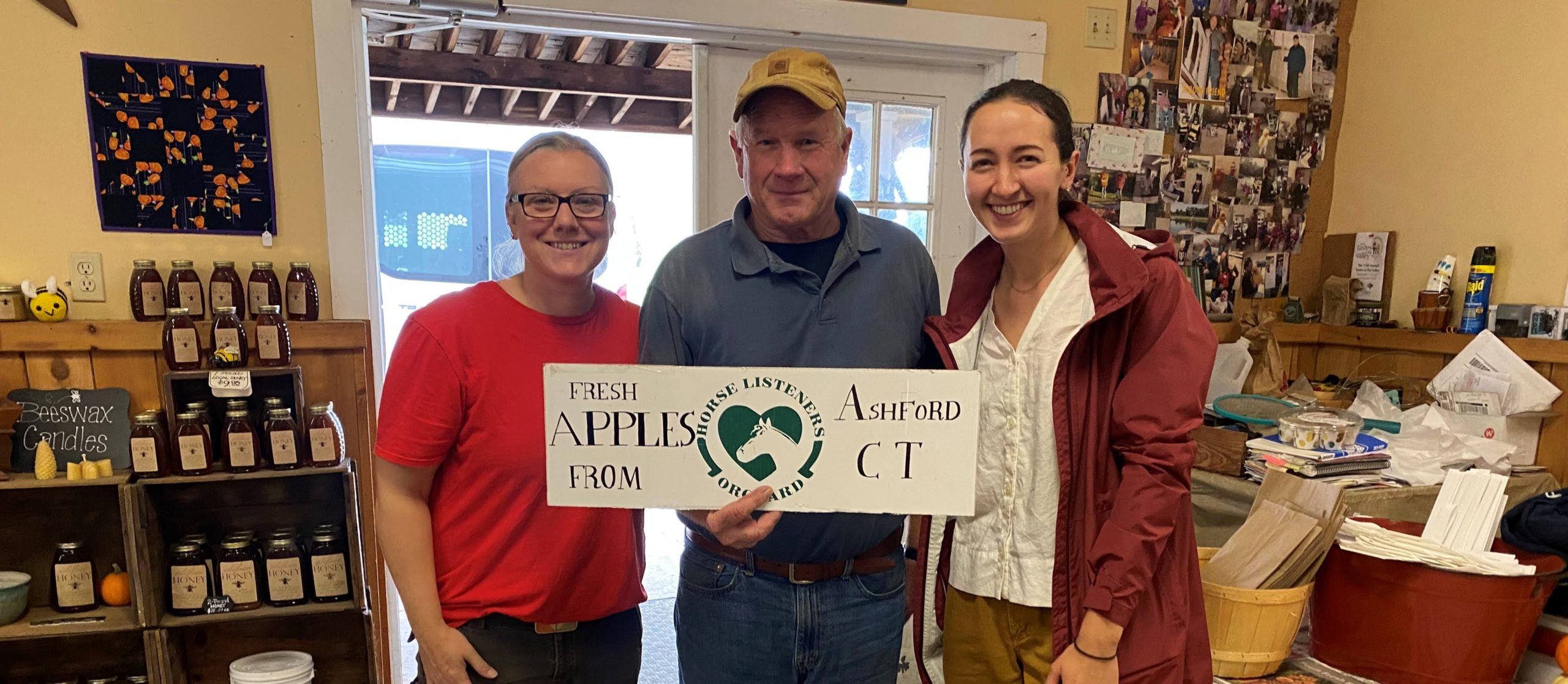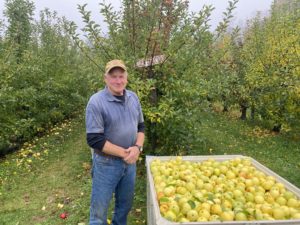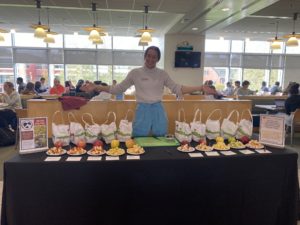Visiting Horse Listeners Orchard: An Exploration of a Thriving Partnership
- by Elise Dudley

Horse Listeners Orchard Worker Crystal Morawitz, General Manager Rick Hutton, and East Coast Fellow Elise Dudley pose in the orchard’s farm store.
It was the end of apple season when I arrived at Horse Listeners Orchard in Ashford, Connecticut. By then, gardens had been hit by a few frosts and trees were beginning to shed their leaves into the dormancy of wintertime.
General Manager Rick Hutton, who runs the 153-acre farm with owner Matt Couzens met me with a smile. I followed Rick on a misty stroll across the orchard, through the crunchy confetti of autumn, and past barren high tunnels that once boasted an abundant crop of tomatoes. As we headed for the Granny Smiths, one of the final apple varieties to ripen, Rick pointed out a newer trellis system for apple trees known as “high density planting.” This technique is becoming more common to yield greater fruit per acre and keep branches lower, which cuts down on labor and nearly eliminates ladder work.

Horse Listeners Orchard General Manager Rick Hutton poses with a bin of freshly picked Golden Delicious apples.
Horse Listeners Orchard has been a long-time Farm to Fork partner of Bon Appétit-served colleges and universities in the northeast region from Connecticut to Massachusetts. Beyond cultivating 23 varieties of apples, and vegetables too, they partner with neighboring growers to aggregate produce — enabling them to source a yearlong supply of crushed tomatoes for our chefs — and deliver it all themselves.
Throughout the fall semester, I had the pleasure of sharing Horse Listeners’ story, as well as nearly a dozen varieties of apples from the adored orchard with students at Roger Williams University in Bristol, RI and Wesleyan University in Middletown, CT. I sliced up and arranged a spread of fragrant, multi-colored varieties: Idared, Granny Smith, Cortland, Cameo, Empire, Creston, Golden Delicious, Jonagold, Stellar, Red Delicious, and Fortune.
As students approached, I would invite them to grab a toothpick and join in on the tasting. Apple-loving students eagerly shared stories of varieties they grew up eating, or the kind of apple their grandmother bakes into pie. Meanwhile others commented “I didn’t know this many varieties of apples existed!” Others asked “Are these natural varieties?!” – shocked to learn about the diversity of apples. I shared about my visit to Horse Listeners’ Orchard, and we discussed how the process of breeding a new apple takes at least 15 years, involving many stages and the evaluation of dozens of traits.

Elise shows off 10 varieties of Horse Listeners’ apples at Roger Williams University.
Back on the farm, Rick shared about how practicing Integrated Pest Management (IPM) holds the Horse Listeners team to a scientific approach. “Back in the old days it used to be a witch’s broom — go out there and spray for everything if it’s there or not,” he explained. But now, they first identify the problem, and then only spray to fix a specific issue. “It makes more economic sense to us and has less environmental impact,” said Rick. He beautifully illustrated the importance of farms being owner operated in the day-to-day: “I’ve raised three kids on the farm…when they go out and pick an apple off the tree, wipe it on their shirt, and take a bite, it is fine with me,” adding “and I know the ins and outs of what we use.” Horse Listeners Orchard never waxes their apples, stating “anything added [to apples] is not necessary.”
As my visit came to a close, Rick recalled the 2007 cover of TIME magazine “forget organic, buy local,” affirming the importance of knowing where your food comes from and how it was grown. Through long-term relationships with Farm to Fork growers like Horse Listeners Orchard, students and chefs alike experience the unique privilege and power of knowing your farmer.